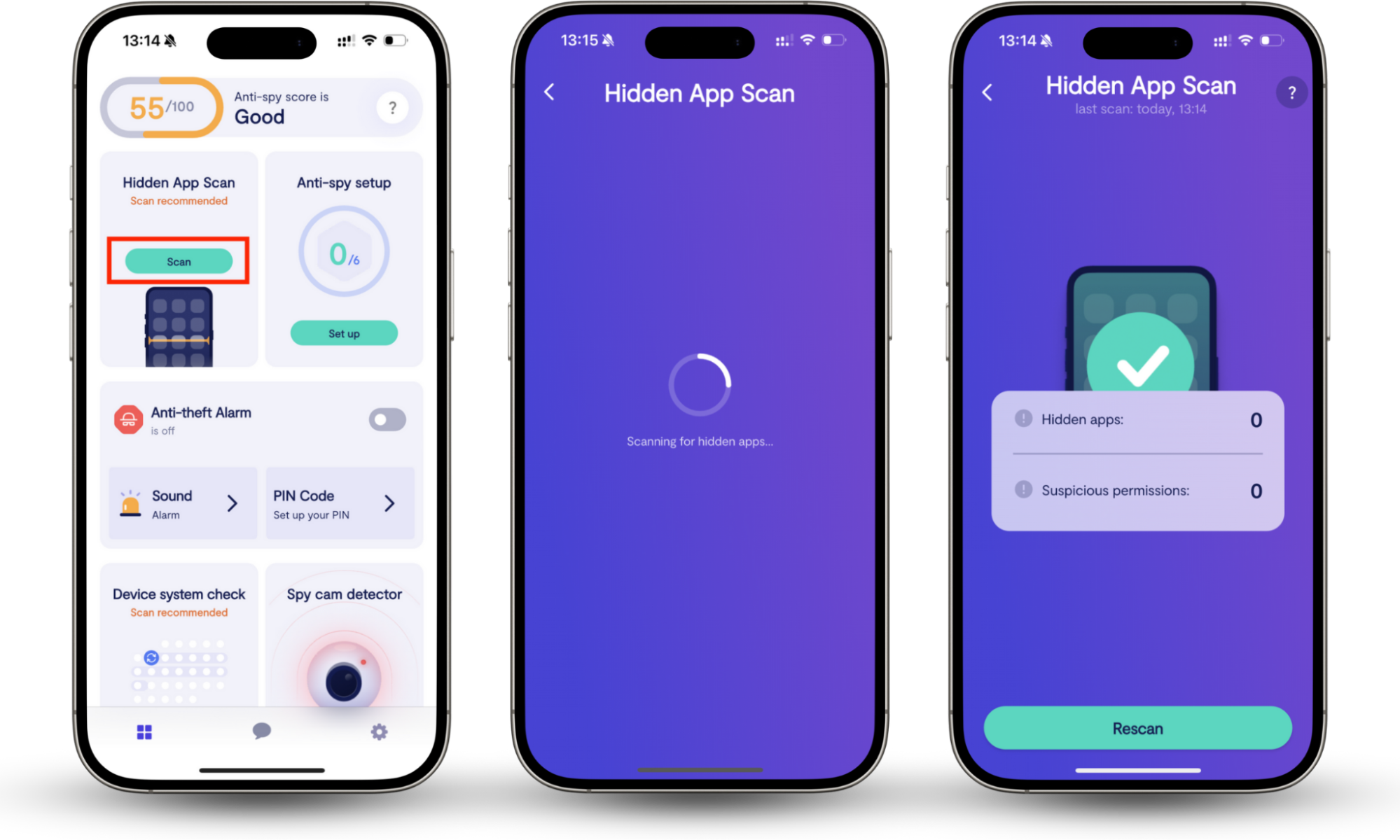Table of contents
- How Facebook viruses actually spread
- What is a Facebook virus?
- How to spot a Facebook threat?
- 1. Urgent personal messages
- 2. Fake Facebook apps
- 3. Facebook video virus
- 4. General spam posts
- How to clean a Facebook virus?
- Step 1: Secure your Facebook account
- Step 2: Secure your browsers
- Step 3: Look for malicious software on your computer
- How to protect yourself from Facebook viruses and scams
- Conclusion
Facebook viruses offer a serious threat to your online security.
In this article, “Facebook virus” refers to two different risks:
- Device infection: malware installed on your computer or phone after you click a link or download a file shared on Facebook.
- Account compromise: scammers trick you into giving them your password or approving access, so they can post or message people as you.
Important
Many incidents aren’t “viruses” in the traditional sense. They’re phishing and social engineering that lead to account takeover.
Facebook is a brilliant social media platform for many reasons, and it is simply essential if you want, um… to exist in the modern world.
But don’t forget Facebook is like a big city airport or train station – you will encounter lots of people, but, unfortunately, some of them might turn out to be crooks or infect you with a virus.
How Facebook viruses actually spread
Most Facebook-related infections and scams follow a few repeatable patterns. Knowing them makes threats easier to spot quickly.
Common ways infections and scams spread on Facebook:
- Malicious links sent in Messenger or posted on a friend’s feed (often from a hacked account).
- Fake login pages that look like Facebook and steal your email/password.
- “Video/player/update” prompts that ask you to install software to view content.
- Rogue browser extensions that modify your browser and hijack sessions.
- Fake apps or games that request risky permissions or redirect to phishing pages.
What is a Facebook virus?
A Facebook virus is either a computer virus your device contracts via Facebook or a social engineering scam you fall victim to through the platform.
In general, criminals aim to gain access to your profile. If they succeed, they will have access to any private information you’ve shared on Facebook, friend list, and messages. It means they’ll be able to interact with your friends, convincing them it’s you. Alongside this, many malware programs are designed to go beyond Facebook to access any other online accounts sharing the same email. In a worst-case scenario, they will infect your computer.
Signs your Facebook account may be compromised:
- Messages were sent that you don’t remember writing
- Posts appear on your timeline without you posting them
- Friend requests were sent or accepted unexpectedly
- You receive password reset emails you didn’t request
- Facebook alerts you about logins from unfamiliar devices/locations
Statistics show data breaches have increased dramatically in the past decade. Viruses are becoming increasingly sophisticated as technologies evolve. Every bug in Facebook’s software also gives criminals an opportunity to push their malware. For example, the latest case of Facebook Messenger app vulnerability allowed attackers to access users’ Windows.
Recent cybersecurity reports continue to show that social media accounts remain a frequent target for phishing, credential theft, and social engineering attacks. For example, recent industry security analyses published in 2025 note that attackers increasingly use compromised social media accounts and messaging platforms to spread phishing links, impersonation scams, and malicious downloads.
How to spot a Facebook threat?
There are tons of Facebook viruses and scams out there, but don’t let this scare you. You can quite easily protect yourself from Facebook malware, you just need to learn how to recognize it first. Here are several sneaky tactics cybercriminals use to lay their hands on your Facebook property.
Quick check before you click:
- Urgency: “Do this now” pressure or emotional manipulation
- Unusual link: shortened URLs or domains you don’t recognize
- Unexpected download: “install/update” prompts to view content
- Login prompt: asked to re-enter credentials outside Facebook
- Impersonation: brand or friend account details don’t match past behavior
1. Urgent personal messages
In this method, fraudsters use social engineering skills to gain access to your personal details.
Say, you receive a message from your Facebook pal claiming he is in trouble and needs your help. It could say your friend is in the hospital and needs you to pay for his hospital bill. This one is easy to recognize because you will feel forced to transfer money as soon as possible. But the best thing to do, in this case, would be to call your friend and make sure you are not being fooled.
How to verify a “friend in trouble” message (fast):
- Don’t click any links and don’t send money immediately.
- Contact the person another way (call, text, WhatsApp) and ask a detail only they would know.
- Check their profile for sudden changes (new name, new profile photo, strange recent posts).
- Look for language mismatch: unusual grammar, tone, or repeated phrasing.
- If it still seems suspicious, report the message and stop responding.
A similar scam is a message from an often well-known company representative asking you to do something like claiming a prize.
Common impersonation red flags:
- The sender asks for codes, passwords, or payment details
- The account name looks close but not exact (extra characters or odd punctuation)
- The message pushes you to act outside normal support channels
If you take a closer look at the message, you will see this is just an impersonator trying to scam you. In order to respond, you will need to submit way too many personal details or download suspicious programs.
All it takes is one little download - and boom! Before you know it, you’re infected and googling how to remove Facebook chat spam virus.
2. Fake Facebook apps
Cybercriminals have learned how to fool us with Facebook apps too. We recognize a familiar game icon, click on it, and a second later, we’re trapped.
For example, hackers can create a twin of your favorite game to spread the Facebook login virus. You open what you think is Candy Crush and see you need to log in. Obviously, you type in your email and password, and fraudsters can now access your credentials to gain full control of your profile.
Or imagine you open a fake Candy Crush, and the app asks you for authorized permissions. Without giving it a second thought, you inadvertently hand over full access to your profile in just a few unfortunate clicks.
Explainer: Why permissions matter
Some apps use permission screens to request access to your account. Be cautious if an app requests more than it needs (for example, posting on your behalf or accessing messages). When in doubt, avoid granting permissions and use official app stores and verified publishers.
3. Facebook video virus
Facebook will typically warn you of the possible risks before redirecting you to another website, but you should still be aware of this kind of fraud.
There are two types of video viruses on Facebook: a Facebook messenger video virus and a Newsfeed video virus. Typically, they link to a third-party resource, followed by a message stating you should definitely watch this video. Trust us, you shouldn’t.
Hackers are doing a great job of making the link look like it’s from YouTube or other well-known resources. If you click on it, a pop-up will offer to install software (aka a virus) to play the video.
How these “video” attacks usually work:
- Fake player/codec prompts to make you install malware
- Phishing pages that ask you to log in again to “watch”
- Lookalike domains designed to resemble YouTube or news sites
Note
Legitimate sites rarely require installing extra software just to watch a video.
If you’ve already downloaded the unknown file, you may now need to get rid of potentially malicious software on your computer. You shouldn’t solely rely on your antivirus as this software can’t always protect you.
4. General spam posts
If something you read on Facebook seems too good to be true or a friend’s post looks way too unrealistic, then you notice unusual patterns in their behavior, trust your gut and act carefully.
What are the chances of your co-worker actually posting a link to a shocking video of Justin Bieber in a nightclub kissing squirrels? Even though curiosity can easily take over common sense, think twice before clicking on any suspicious links.
Ignore tempting online lotteries and ‘claim your reward’ messages as they are often potential threats too. Before engaging with any suspicious activity on Facebook, even with people you supposedly know, make sure it’s them who are posting on their wall or messaging you. Ask follow-up questions or contact them by other means of communication. You should always stay cautious.
What to do if a friend’s account is posting spam:
- Don’t click or share the link.
- Message the person outside Facebook to warn them.
- Report the post/account in Facebook.
- Remove the connection (unfollow/unfriend) if the account continues spamming.
- If you interacted with the link, jump to the cleanup steps below.
But let’s suppose you came across this article far too late, and you’re already a victim of Facebook hackers. This raises the question…
Before you start
You may need to do two cleanups — one for your Facebook account (password, sessions, permissions) and one for your device (browser extensions, unwanted apps, malware). Doing both reduces the chance the problem comes back.
How to clean a Facebook virus?
We decided to pull together a few simple virus removal methods you can perform yourself. If you have any difficulties with the following instructions or you want to make sure you’re doing everything correctly – please feel free to contact us for guidance.
Step 1: Secure your Facebook account
You’ve already learned how to stop Facebook virus messages (just don’t click on strange links!). Now it’s time to protect your profile.
1. Make sure you are not a victim of a Facebook virus in an app
Log in to your Facebook profile, select Settings by clicking on the arrow pointing downwards on the right upper corner of the blue panel, then select Apps and Websites. Check for suspicious apps and click Remove on any you’d like to avoid.
2. Change your password
Go to General Account Settings to change your password. Your new password should be at least eight characters long, include a special character as well as feature a mixture of lowercase and uppercase letters, and a number. Make it as difficult to guess as possible.
3. Check active sessions
You won’t be kicked out from your Facebook account if someone else has access to it, so make sure you don’t have any active sessions besides yours. In Settings, choose Security and Login and see Where You're Logged In. If you see any unknown devices and locations, don’t hesitate to log out from these sessions.
4. Enable two-factor authentication
This move won’t protect you from Facebook malware, but it will secure your account from hacker attacks. Scroll down in the Security and Login menu, then in the Two-Factor Authentication section, click Edit. Secure your account either with Authentication App or Text Message authentication.
5. Turn on login alerts (recommended)
In Security and Login, enable alerts for unrecognized logins. This helps you react quickly if your account is accessed again.
6. Run a privacy/security review
Use Facebook’s privacy/security tools to review who can see your posts, which devices are trusted, and what information is public.
Step 2: Secure your browsers
The next step is to make sure your browsers are not compromised by any parasitic extensions.
Browser cleanup checklist (works for any browser):
- Remove extensions you don’t recognize or no longer use
- Disable suspicious site notifications (pop-up permission abuse)
- Clear cookies and cached site data
- Update the browser to the latest version
- After cleanup, restart the browser and re-check extensions
Safari
Open the Safari browser and click on the browser’s name in the top menu bar. Choose Preferences and navigate to the Extensions tab. Uninstall any shady extension. After this, you will also need to restart Safari:
- Click on the browser’s name in the top menu bar.
- Pick Clean history, make sure to select the All history option, and click the Clean history button.
- Go to Safari > Preferences > Advanced and check the Show Develop menu in menu bar option.
- Look at the top menu bar again, click on Develop, then select Empty Caches.
- Restart Safari.
Google Chrome
Type chrome://extensions in your address bar. Remove any suspicious looking extensions. Then type chrome://settings in your address bar and pick Advanced settings. Find the Reset button and reset your browser.
Mozilla Firefox
Type about:addons in the address bar and select Extensions. Remove any extensions you are unaware of. As with Chrome, you will need to reset your browser to activate any changes. Type about:support and choose to Refresh Firefox.
Internet Explorer
Find and click on a gear icon in the top right corner of your Internet Explorer (IE). Choose the Manage Add-ons option and disable all suspicious add-ons. Go back to the gear icon to access Internet Options. Then go to the Advanced tab and reset your IE browser.
Step 3: Look for malicious software on your computer
Invasive programs such as adware or browser hijackers can be a reason why your Facebook account is acting weird. Such junkware is difficult to spot. If your computer is infected, you can experience slowdowns, random browser redirects or unknown pop-ups. Be sure to clean it as soon as you notice any strange activity.
Extra signs your device may be infected:
- New toolbars/extensions you didn’t install
- Antivirus or security settings disabled unexpectedly
- Browser homepage/search engine changes you didn’t set
- Frequent redirects to unrelated sites
- Pop-ups asking you to call a number or install “cleanup” software
On Mac
Contrary to popular opinion, Mac computers do get viruses.
It is very difficult to remove potential Facebook malware from your Apple computer yourself. If you suspect you are infected, clean your browsers’ extensions as in the instructions above, then secure your Facebook account, and try updating your Mac OS. If you still need help after this, consider hiring a professional to remove the junkware for you.
And protect your Mac computer with an antivirus from now on.
On PC
Safety note
Be cautious with system tools and settings. If you’re unsure about a program, search its name and publisher first, and use official Microsoft security guidance where possible. When in doubt, get professional help to avoid removing legitimate system components.
If you suspect a Facebook-related infection on your Windows PC, start by checking installed programs for unfamiliar or potentially unwanted software, as these can sometimes interfere with browsers, accounts, or system security. Here is how to do it:
- Press Windows key + R to open the Regedit (Registry edit) window. Type Control Panel and click OK. Alternatively, open the Windows Start menu and use the search box to find and open Control Panel.
- In Control Panel, look for Programs and Features. If you’re using an older Windows version, it will be the Add/Remove Programs section instead of Programs and Features.
- You will see a list of programs currently installed on your PC. Uninstall any suspicious-looking programs. Follow instructions for the program uninstall wizard to completely delete it from your computer.
On mobile devices
We advise taking your device to a service center if you notice any suspicious behavior as it can be very difficult to clean your phone or tablet on your own.
If you have an Android phone, you can look for unknown programs on your device, then delete them yourself. As for iOS users, we recommend check your iPhone for malware in case of any unusual activity on the device.
If you want ongoing monitoring rather than one-time checks, mobile security tools, like Clario Anti Spy (iOS and Android), include a Hidden app scan feature that checks your device for spyware-type apps or suspicious software that may have been installed without your knowledge. This can help identify apps that potentially access messages, location data, or social media accounts without proper authorization.
If you are concerned about actual threats on your phone, use Clario Anti Spy to check for malicious software:
- Open Clario Anti Spy and select Scan under the Hidden app scan feature.
- Clario will run a full scan of your mobile device. This looks for signs of spying apps, like spyware and parental control apps that someone may have secretly installed.
- Review the results. The tool analyses all requested app permissions, helping you to detect suspicious ones that don’t belong.

Mobile safety tips to prevent repeat infections:
- Install apps only from official stores and check the publisher name
- Review app permissions (camera, SMS, accessibility access) and remove anything unnecessary
- Keep your OS updated and avoid “security” apps from unknown vendors
- If Facebook is behaving strangely, change your password and log out of other sessions first
How to protect yourself from Facebook viruses and scams
Indeed, there are many ways cybercriminals can use Facebook to target you. That’s why you should secure your social media life by following these simple steps:
- Don’t click on any suspicious links. Even if they are sent by your best friend.
- Don’t download any untrustworthy software from unknown resources, even if a pop-up insists it is a matter of life and death.
- Use unique passwords (or a password manager). If the same password is used on multiple sites, a single compromise can spread beyond Facebook. A password manager makes strong, unique passwords easier to maintain.
- Protect your devices. Install high-quality antivirus software from a trusted provider and consider using a Virtual Private Network (or VPN). If you’re still looking for such a provider, feel free to protect your social media life with Clario Anti Spy today.
Be careful out there. Remember, your online safety is in your hands.
Conclusion
Facebook threats continue evolving, but consistent security habits can significantly reduce your risk. Staying alert to suspicious messages, reviewing app permissions regularly, and keeping devices protected are key steps. If you prefer ongoing monitoring instead of occasional checks, tools like Clario Anti Spy offer features such as hidden app scans that help identify suspicious apps and support better control over your social media privacy.
Read more:


